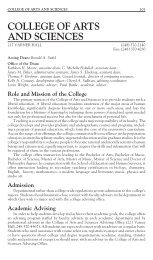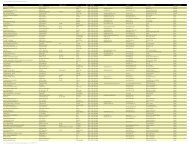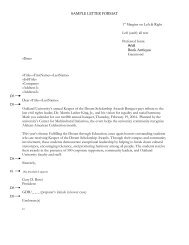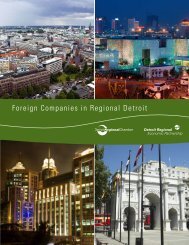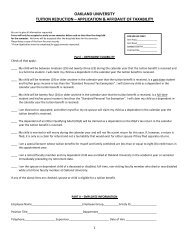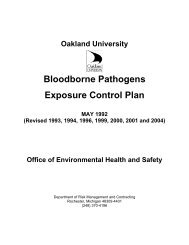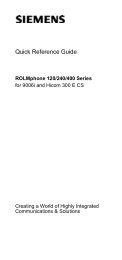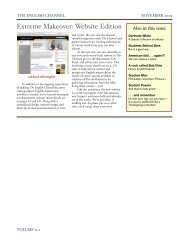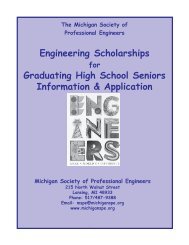Department of Mechanical Engineering - Oakland University
Department of Mechanical Engineering - Oakland University
Department of Mechanical Engineering - Oakland University
You also want an ePaper? Increase the reach of your titles
YUMPU automatically turns print PDFs into web optimized ePapers that Google loves.
466 SCHOOL OF ENGINEERING AND COMPUTER SCIENCE<br />
DEPARTMENT OF<br />
MECHANICAL<br />
ENGINEERING<br />
170 DODGE HALL (248) 370-2210<br />
Chairperson: Gary C. Barber<br />
Pr<strong>of</strong>essors emeriti: Robert Edgerton, Michael Y.Y. Hung, Gilbert L. Wedekind<br />
Pr<strong>of</strong>essors: Gary C. Barber, Bhushan L. Bhatt, Ren-Jyh Gu,Zissimos Mourelatos, Sayed Nassar<br />
Associate pr<strong>of</strong>essors: Ching L. Ko, Christopher Kobus, Michael A. Latcha, Keyu Li,<br />
Brian P. Sangeorzan, Lorenzo Smith, Lianxing Yang<br />
Assistant pr<strong>of</strong>essors: Yin-Ping Chang, Laila Guessous, Xia Wang, Qian Zou<br />
Adjunct pr<strong>of</strong>essors: Ismat Abu-Isa, Alex Alkidas, Francis H.K. Chen, Yung-Li Lee<br />
Adjunct associate pr<strong>of</strong>essors: Fang Chen, Yung Chiang, Yung-Li Lee, Peter Peng, Phil Szuba,<br />
Simon C.Y. Tung<br />
Adjunct assistant pr<strong>of</strong>essors: Suresh Ramalingham, Saeed Siavoshani<br />
Advisory Board<br />
The <strong>Mechanical</strong> <strong>Engineering</strong> and Manufacturing <strong>Engineering</strong> Option Advisory Board<br />
assists the department in enhancing its educational and research programs and ensuring<br />
their relevance to current and emerging technological needs. Board members are:<br />
Jack Dawson, Vice President <strong>of</strong> Technology, DANA Corporation, Fluid System Products<br />
David Gorsich, Ph.D., Associate Director, Modeling and Simulation, TARDEC<br />
Suresh Ramalingham, Senior Project Engineer, Advanced Manufacturing, DaimlerChrysler<br />
Corporation<br />
John Siavoshani, Ph.D., Senior Engineer, Dow Automotive<br />
Philip Szuba, Ph.D., Manager, Research and New Product Development, Lamb Technicon<br />
Yucong Wang, Ph.D., Surface <strong>Engineering</strong> and Tribology Center, General Motors Powertrain<br />
Li Zhang, Manager, Theme Development, DaimlerChrysler Corporation<br />
Mission<br />
The <strong>Department</strong> <strong>of</strong> <strong>Mechanical</strong> <strong>Engineering</strong> carries out the mission <strong>of</strong> the School <strong>of</strong><br />
<strong>Engineering</strong> and Computer Science by <strong>of</strong>fering undergraduate majors in mechanical engineering<br />
including various options. The department also <strong>of</strong>fers a master’s program in<br />
mechanical engineering and a Ph.D in mechanical engineering.<br />
Major in <strong>Mechanical</strong> <strong>Engineering</strong><br />
The field <strong>of</strong> mechanical engineering <strong>of</strong>fers career opportunities in areas such as design,<br />
analysis, test development, research and the manufacturing <strong>of</strong> various products. <strong>Oakland</strong><br />
<strong>University</strong>’s mechanical engineering program provides the student with a foundation in the<br />
fundamental concepts and principles associated with mechanics <strong>of</strong> solids, thermodynamics,
SCHOOL OF ENGINEERING AND COMPUTER SCIENCE 467<br />
fluid and thermal energy, materials, manufacturing, design <strong>of</strong> mechanical systems, electrical<br />
circuits, computer programming and s<strong>of</strong>tware utilization. A strong laboratory experience<br />
and the utilization <strong>of</strong> instrumentation and computers is interwoven through the curriculum.<br />
The program also provides numerous engineering design experiences.<br />
Program educational objectives<br />
The objectives <strong>of</strong> the <strong>Mechanical</strong> <strong>Engineering</strong> program are to produce graduates who:<br />
• are able to analyze, design, develop and test components and systems in the areas <strong>of</strong><br />
mechanics and fluid and thermal sciences;<br />
• can adapt and contribute to new technologies and methods and to use them in engineering<br />
applications;<br />
• are prepared to pursue successfully graduate study in mechanical/manufacturing engineering<br />
or other advanced post-graduate education;<br />
• are pr<strong>of</strong>icient in written and oral communication;<br />
• can function successfully in the automotive and other global industries;<br />
• can serve in a variety <strong>of</strong> roles within or leading a team solving problems with technical<br />
and non-technical elements; and<br />
• have high standards <strong>of</strong> pr<strong>of</strong>essional integrity and ethical responsibility.<br />
The <strong>Mechanical</strong> <strong>Engineering</strong> program is accredited by the <strong>Engineering</strong> Accreditation<br />
Commission <strong>of</strong> the Accreditation Board for <strong>Engineering</strong> and Technology (ABET).<br />
Requirements for major in mechanical engineering<br />
To earn the degree <strong>of</strong> Bachelor <strong>of</strong> Science in <strong>Engineering</strong> with a major in mechanical<br />
engineering, students must complete a minimum <strong>of</strong> 128 credits, satisfy writing requirement<br />
(see Undergraduate degree requirements) and meet the following requirements:<br />
Credits<br />
General Education (excluding mathematics and science) 24<br />
Mathematics and science<br />
MTH 154-155 Calculus 8<br />
APM 255 Introduction to Differential Equations with Matrix Algebra 4<br />
MTH 254 Multivariable Calculus 4<br />
CHM 143 Chemical Principles (or CHM 157 or 162) 4<br />
PHY 151-152 Introductory Physics 8<br />
Approved math or science elective<br />
(See list <strong>of</strong> courses below) 4<br />
32<br />
<strong>Engineering</strong> core<br />
EGR 120 Computer Graphics and CAD 1<br />
EGR 141 Computer Problem Solving in <strong>Engineering</strong> and Computer Science 4<br />
EGR 240 Introduction to Electrical and Computer <strong>Engineering</strong> 4<br />
EGR 250 Introduction to Thermal <strong>Engineering</strong> 4<br />
EGR 260 Introduction to Industrial and Systems <strong>Engineering</strong> 4<br />
EGR 280 Design and Analysis <strong>of</strong> Electromechanical Systems 4<br />
21
468 SCHOOL OF ENGINEERING AND COMPUTER SCIENCE<br />
Pr<strong>of</strong>essional subjects<br />
Required:<br />
ME 308 Computer Aided Design 3<br />
ME 322 <strong>Engineering</strong> Mechanics 4<br />
ME 331 Introduction to Fluid and Thermal Energy Transport 4<br />
ME 361 Mechanics <strong>of</strong> Materials 4<br />
ME 372 Properties <strong>of</strong> Materials 4<br />
ME 421 Vibrations and Controls 4<br />
ME 486 <strong>Mechanical</strong> Systems Design 4<br />
ME 456 or ME 482 Energy Systems Analysis and Design or<br />
Fluid and Thermal Systems Design 4<br />
ME 492 or ME 490* Senior <strong>Mechanical</strong> <strong>Engineering</strong> Design Project or Senior Project 4<br />
35<br />
Electives —<br />
Pr<strong>of</strong>essional electives: three mechanical engineering electives<br />
(see description below) 12<br />
Free electives: (may be used to satisfy writing requirement) 4<br />
Total 128<br />
*ME 490 requires approval <strong>of</strong> project proposal by the <strong>Mechanical</strong> <strong>Engineering</strong> Dept., if taken<br />
in place <strong>of</strong> ME 492 and project must be team-based.<br />
Economics requirement<br />
In addition to the requirements stated above, mechanical engineering students must fulfill<br />
the economics requirement. This may be met by completion <strong>of</strong> ECN 150, 200, 201 or<br />
210. However, ECN 201 is not part <strong>of</strong> the general education requirement.<br />
Performance requirements<br />
In addition to previously stated requirements, satisfactory completion <strong>of</strong> the program<br />
requires an average grade <strong>of</strong> at least 2.00 within each group: namely, mathematics and science,<br />
core subjects, and pr<strong>of</strong>essional subjects. Within pr<strong>of</strong>essional subjects, at most two<br />
grades below 2.0 are permitted; at most two different courses may be repeated and a total <strong>of</strong><br />
three repeat attempts is permitted.<br />
Approved math or science electives<br />
Students majoring in mechanical engineering are advised to take MTH 275 to broaden<br />
their knowledge <strong>of</strong> linear algebra. However, students having an explicit interest in broadening<br />
their knowledge in a specific area <strong>of</strong> mathematics or science should elect a course from<br />
the following approved course list. For more information about these selections, students are<br />
encouraged to visit with an undergraduate adviser before registering for an approved math or<br />
science elective.<br />
APM 332 Applied Matrix Theory (4)<br />
APM 357 Elements <strong>of</strong> Partial Differential Equations (4)<br />
APM 433 Numerical Methods (4)<br />
APM 434 Applied Numerical Methods: Matrix Methods (4)<br />
CHM 158 General Chemistry II (5)<br />
BIO 111 Biology (4)
SCHOOL OF ENGINEERING AND COMPUTER SCIENCE 469<br />
PHY 325 Biological Physics (4)<br />
PHY 331 Optics (4)<br />
PHY 366 Vibrations and Waves (4)<br />
PHY 371 Foundations <strong>of</strong> Modern Physics (4)<br />
MTH 275 Linear Algebra (4)<br />
MTH 352 Complex Variables (4)<br />
Or others by approval by petition to the SECS Committee on Academic Standing.<br />
<strong>Mechanical</strong> engineering electives<br />
<strong>Mechanical</strong> engineering students must complete at least three (3) additional 400- or<br />
500-level courses with an ME designation or other approved 400-level engineering courses<br />
with a ECE, ISE designation. However, students may not take more than one <strong>of</strong> the following<br />
courses:<br />
ME 476 Product and Process Development (4)<br />
ME 477 Concurrent <strong>Engineering</strong> (4)<br />
ME 494** Independent Study (2-4)<br />
ECE 431 Automatic Control Systems (4)<br />
ISE 469 Computer Simulation <strong>of</strong> Disccrete Event Systems (4)<br />
ISE 483 Production Systems and Workflow Analysis (4)<br />
Students interested in broadening their knowledge in a specific area <strong>of</strong> mechanical engineering<br />
should elect sequences <strong>of</strong> courses as described in the specialized pr<strong>of</strong>essional options<br />
listed below to satisfy the mechanical engineering electives requirement. These options list<br />
elective courses that are fundamental to each area, as well as other relevant pr<strong>of</strong>essional<br />
electives.<br />
Pr<strong>of</strong>essional Options<br />
1. Fluid and thermal systems option<br />
This option includes courses in the fluid and thermal energy transport area.<br />
Recommended fundamental subjects:<br />
ME 438 Fluid Transport (4)<br />
ME 448 Thermal Energy Transport (4)<br />
Other relevant courses:<br />
ME 423 Acoustics and Noise Control (4)<br />
ME 439 Computational Fluid Dynamics (4)<br />
ME 449 Numerical Techniques in Heat Transfer and Fluid Flow (4)<br />
ME 454 Solar and Alternate Energy Systems (4)<br />
ME 456 Energy Systems Analysis and Design (4)<br />
ME 457 Internal Combustion Engines I (4)<br />
ME 482 Fluid and Thermal Systems Design (4)<br />
ME 490 Senior Project (4)
470 SCHOOL OF ENGINEERING AND COMPUTER SCIENCE<br />
2. Computer-aided design option<br />
This option includes courses in the computer-aided design (CAD) and analysis area.<br />
Recommended fundamental subjects:<br />
ME 487 <strong>Mechanical</strong> Computer-Aided <strong>Engineering</strong> (4)<br />
ME 488 <strong>Mechanical</strong> Computer-Aided Manufacturing (4)<br />
Other relevant courses:<br />
ME 439 Computational Fluid Dynamics (4)<br />
ME 449 Numerical Techniques in Heat Transfer and Fluid Flow (4)<br />
ME 472 Material Properties and Processes (4)<br />
ME 490 Senior Project (4)<br />
ECE 431 Automatic Control Systems (4)<br />
ECE 463 Foundations <strong>of</strong> Computer-Aided Design (4)<br />
3. Automotive <strong>Engineering</strong> option<br />
This option includes courses with an automotive engineering emphasis area with two possible<br />
areas <strong>of</strong> specialty: automotive structures or internal combustion engines.<br />
Recommended fundamental subjects: Automotive Structures Specialty<br />
ME 461 Analysis and Design <strong>of</strong> <strong>Mechanical</strong> Structures (4)<br />
ME 484 Automotive <strong>Engineering</strong> Design I (4)<br />
or<br />
Recommended fundamental subjects: Internal Combustion Engines Specialty<br />
ME 456 Energy Systems Analysis and Design (4)<br />
ME 457 Internal Combustion Engines I (4)<br />
Other relevant courses:<br />
ME 423 Acoustics and Noise Control (4)<br />
ME 430 Kinematics and Mechanisms (4)<br />
ME 438 Fluid Transport (4)<br />
ME 439 Computational Fluid Dynamics (4)<br />
ME 448 Thermal Energy Transport (4)<br />
ME 467 Optical Measurement and Quality Inspection (4)<br />
ME 487 <strong>Mechanical</strong> Computer-Aided <strong>Engineering</strong> (4)<br />
ME 489 Fasteners and Bolted Joints (4)<br />
ME 490 Senior Project (4)<br />
ECE 431 Automatic Control Systems (4)<br />
ECE 473 Automotive Electronics (4)<br />
ECE 475 Automotive Mechatronics I (4)<br />
4. Manufacturing <strong>Engineering</strong> option<br />
This option includes courses in the manufacturing area.<br />
Recommended fundamental subjects:<br />
ME 472 Material Properties and Processes (4)<br />
ME 474 Manufacturing Processes (4)
SCHOOL OF ENGINEERING AND COMPUTER SCIENCE 471<br />
Other relevant courses:<br />
ME 444 Plastics Processing <strong>Engineering</strong> (4)<br />
ME 467 Optical Measurement and Quality Inspection (4)<br />
ME 473 Flexible Manufacturing Systems (4)<br />
ME 478 Robotic Systems (4)<br />
ME 488 <strong>Mechanical</strong> Computer-Aided Manufacturing (4)<br />
ME 490 Senior Project (4)<br />
ECE 431 Automatic Control Systems (4)<br />
ISE 469 Computer Simulation <strong>of</strong> Discrete Event Systems (4)<br />
ISE 483 Production Systems and Workflow Analysis (4)<br />
ISE 484 Flexible Manufacturing Systems (4)<br />
ISE 485 Statistical Quality Analysis (4)<br />
5. Plastics and Composites Manufacturing <strong>Engineering</strong> option<br />
This option includes courses in the plastics and composites manufacturing area.<br />
Recommended fundamental subjects:<br />
ME 443 Polymeric Materials (4)<br />
ME 444 Plastics Processing <strong>Engineering</strong> (4)<br />
ME 445 Plastics Product Design (4)<br />
ME 490 Senior Project (4)<br />
Sample mechanical engineering schedule<br />
Students entering the School <strong>of</strong> <strong>Engineering</strong> and Computer Science with the required<br />
background may follow a schedule such as the one indicated below. However, students will<br />
need additional time to complete the program if they do not have the required background<br />
upon entrance to the program.<br />
Freshman year— fall semester: EGR 120, MTH 154, CHM 143, EGR 141, general education,<br />
17 credits; winter semester: MTH 155, PHY 151, EGR 240, general education, 16<br />
credits.<br />
Sophomore year — fall semester: APM 255, PHY 152, EGR 250, general education, 16<br />
credits; winter semester: MTH 254, EGR 260, EGR 280, general education, 16 credits.<br />
Junior year — fall semester: ME 322, ME 331, ME 372, general education, 16 credits; winter<br />
semester: ME 308, ME 361, free or pr<strong>of</strong>essional elective, science elective, 15 credits.<br />
Senior year— fall semester: ME 421, ME 486, one pr<strong>of</strong>essional subject (required or elective),<br />
general education, 16 credits; winter semester: ME 492, three pr<strong>of</strong>essional subjects<br />
(required or elective), 16 credits.




